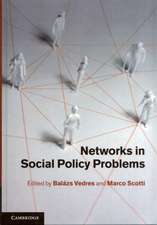Order on the Edge of Chaos: Social Psychology and the Problem of Social Order
Editat de Edward J. Lawler, Shane R. Thye, Jeongkoo Yoonen Limba Engleză Paperback – 8 dec 2015
| Toate formatele și edițiile | Preț | Express |
|---|---|---|
| Paperback (1) | 270.45 lei 6-8 săpt. | |
| Cambridge University Press – 8 dec 2015 | 270.45 lei 6-8 săpt. | |
| Hardback (1) | 557.06 lei 6-8 săpt. | |
| Cambridge University Press – 8 dec 2015 | 557.06 lei 6-8 săpt. |
Preț: 270.45 lei
Nou
Puncte Express: 406
Preț estimativ în valută:
51.75€ • 53.93$ • 42.85£
51.75€ • 53.93$ • 42.85£
Carte tipărită la comandă
Livrare economică 03-17 aprilie
Preluare comenzi: 021 569.72.76
Specificații
ISBN-13: 9781107433977
ISBN-10: 1107433975
Pagini: 342
Ilustrații: 11 b/w illus. 2 tables
Dimensiuni: 152 x 229 x 19 mm
Greutate: 0.46 kg
Editura: Cambridge University Press
Colecția Cambridge University Press
Locul publicării:New York, United States
ISBN-10: 1107433975
Pagini: 342
Ilustrații: 11 b/w illus. 2 tables
Dimensiuni: 152 x 229 x 19 mm
Greutate: 0.46 kg
Editura: Cambridge University Press
Colecția Cambridge University Press
Locul publicării:New York, United States
Cuprins
1. The social psychology of social order: an introduction Edward J. Lawler, Shane R. Thye and Jeongkoo Yoon; 2. The evolutionary biology and the sociology of social order Jonathan Turner; 3. Social rationality and weak solidarity: a co-evolutionary approach to social order Siegwart Lindenberg; 4. An integrative theory of action: the model of frame selection Hartmut Esser and Clemens Kroneberg; 5. The center cannot hold: networks, echo chambers, and polarization Daniel J. DellaPosta and Michael W. Macy; 6. Social exchange and social order: an affect theory approach Edward J. Lawler, Shane R. Thye and Jeongkoo Yoon; 7. Institutions, trust, and social order Karen S. Cook; 8. Identity verification and the social order Peter J. Burke and Jan E. Stets; 9. Identities, roles, and social institutions: an affect control account of social order David R. Heise, Neil J. MacKinnon and Wolfgang Scholl; 10. The gender frame and social order Cecilia L. Ridgeway; 11. Status, power, and social order Theodore Kemper; 12. Interaction order: the making of social facts Anne Warfield Rawls; 13. The arts of together: social coordination as dyadic achievement Hannah Wohl and Gary Alan Fine; 14. Dignity as moral motivation: the problem of social order writ small Steven Hitlin and Matthew Andersson; 15. The legitimacy of groups and the mobilization of resources Morris Zelditch; 16. Social order from the bottom up? Peter V. Marsden.
Recenzii
'Too often, the deep social theory questions that sit at the root of classical social theory are ignored by rigorous contemporary scientific theory that is focused primarily on solving practical middle-range problems. Thankfully, this book bucks that trend and collects careful and clear theorizing on the relation between social action and social order. The works collected here represent the very best of contemporary sociological social psychology, deeply motivated by the fundamental question of social order. The results speak to questions of power, identity, stability, meaning, morals, and more. The work will be a key resource for students in social theory courses and professional sociologists seeking to answer big questions in a rigorous manner.' James Moody, Robert O. Keohane Professor of Sociology, Duke University, North Carolina
'In fifteen chapters (plus introduction), today's leading social psychologists and theorists focus their expertise on a crucial question: How is social order possible in our complex, diverse societies? The chapters describe a variety of ways, many of which are not obvious, that interactions create and perpetuate beneficial or injurious social structures and institutions. Interactions carve patterns from the infinite possibilities for action and structure, and understanding the principles governing interactions allows for a measure of control over the outcomes.' Murray Webster, University of North Carolina, Charlotte
'This collection tackles a fundamental issue in the analysis of human behavior: How is order established and maintained? While many have addressed this issue at the macro-level, the micro-level is often neglected or even ignored. But in exciting, yet nuanced, fashion, each of these eminent scholars convincingly demonstrates the microfoundations of order or disorder. In doing so, they highlight the importance of individual choice and the enormous power of social relations and networks.' Jane Sell, Texas A & M University
'Order on the Edge of Chaos represents a compendium of microsociological solutions to the Hobbesian problem of social order. In it, many of the world's top sociologists make their case for why their theoretical dynamic, or phenomenon of interest, is critical to understanding social organization from the bottom up. The result is a fascinating tournament for theoretical primacy and substantive significance. A must-read, relevant to sociologists of all persuasions.' Robb Willer, Stanford University, California
'… the compilation offers a wide range of alternative and sometimes complementary frameworks, concepts, and processes for guiding scholars in explorations of the links that bond the individual to the social.' Choice
'In fifteen chapters (plus introduction), today's leading social psychologists and theorists focus their expertise on a crucial question: How is social order possible in our complex, diverse societies? The chapters describe a variety of ways, many of which are not obvious, that interactions create and perpetuate beneficial or injurious social structures and institutions. Interactions carve patterns from the infinite possibilities for action and structure, and understanding the principles governing interactions allows for a measure of control over the outcomes.' Murray Webster, University of North Carolina, Charlotte
'This collection tackles a fundamental issue in the analysis of human behavior: How is order established and maintained? While many have addressed this issue at the macro-level, the micro-level is often neglected or even ignored. But in exciting, yet nuanced, fashion, each of these eminent scholars convincingly demonstrates the microfoundations of order or disorder. In doing so, they highlight the importance of individual choice and the enormous power of social relations and networks.' Jane Sell, Texas A & M University
'Order on the Edge of Chaos represents a compendium of microsociological solutions to the Hobbesian problem of social order. In it, many of the world's top sociologists make their case for why their theoretical dynamic, or phenomenon of interest, is critical to understanding social organization from the bottom up. The result is a fascinating tournament for theoretical primacy and substantive significance. A must-read, relevant to sociologists of all persuasions.' Robb Willer, Stanford University, California
'… the compilation offers a wide range of alternative and sometimes complementary frameworks, concepts, and processes for guiding scholars in explorations of the links that bond the individual to the social.' Choice
Descriere
Order on the Edge of Chaos answers the question: how do people today create and sustain order in their lives and in their groups?



















